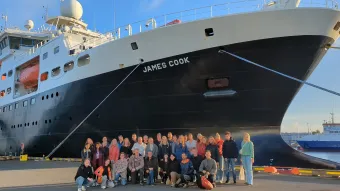
This week, the British Embassy in Iceland held a ‘Future Careers" event onboard the National Oceanography Centre’s (NOC) global-class research vessel RRS James Cook, inspiring the next generation of Icelandic ocean scientists and mariners.
Hosted by the ship’s Captain and crew, Icelandic University students, professors and embassy officials toured the research vessel and learnt about the diverse career roles available at sea. Ocean scientists also engaged with attendees about their upcoming ambitious expedition to the Iceland Basin, connecting global scientific efforts with local communities.
The event forms part of the Embassy’s programme of activity on education and careers of the future.
NOC’s research ships play a crucial role in exploring remote and challenging areas of the ocean, including the Arctic region. Captain John Leask thanked the Embassy and University students for attending, saying: “It was a pleasure to engage with the British Embassy and local students and to offer the students a chance to learn more about the vital roles that mariners play. This critical ocean exploration wouldn’t be possible without NOC’s dedicated mariners, who spend long periods of time at sea, supporting a vast range of ocean science programmes and exciting technology developments.”
Setting sail for the Iceland Basin
Scientists and crew have today (6th September) set sail onboard the RRS James Cook for the BIO-Carbon programme’s Autumn expedition. Building on the Spring expedition which has already seen scientists spend 37 days at sea onboard RRS Discovery earlier this year, scientists are returning to the North Atlantic, south of Iceland to collect novel datasets to inform the next generation of climate modelling.
The first expedition also saw ALR 4, better known as Boaty McBoatface, complete its first ever country to country mission after being recovered by NOC engineers last month.
Scientists know that marine organisms play a critical role in storing carbon in the ocean that might otherwise remain in the atmosphere. However, recent evidence suggests that climate models are not fully accounting for the impact of potential changes in biological processes. This could hinder predictions of the ocean’s role in future carbon storage at a critical time.
The JC269 expedition will see the retrieval of the gliders deployed on the Spring expedition and a continuation of groundbreaking BIO-Carbon fieldwork.
The exciting combination of field research and cutting-edge autonomous tech across the two expeditions will provide rare in situ observations across a whole seasonal cycle with intense sampling across the most biologically active seasons.
The ambitious BIO-Carbon programme, funded by the Natural Environment Research Council (NERC), will deliver the new understanding necessary to make robust predictions for how oceanic carbon storage may alter under climate change.
Next stop Cardiff
Following the JC269 expedition, the RRS James Cook will dock in Cardiff to be part of a free public event, “Archwiliwch ein planed – Explore our planet” hosted by NERC in partnership with NOC and Techniquest, Cardiff.
The event, taking place from 18–20 October, will be based at Techniquest, and include public access to the RRS James Cook. The event and activities will bring the world of environmental science to the public, full of fun, facts and interactive environmental science with hands-on attractions and in-person talks by the UK’s leading environmental scientists.
“Archwiliwch ein planed – Explore our planet” will include free, ticketed access to Techniquest – the Cardiff based science discovery centre focused on exploring the world of science, technology, engineering and mathematics for schools, families and adult visitors.
Notes to editors
For press enquiries, please contact: communications@noc.ac.uk
About NOC
NOC is the UK’s leading institution for integrated coastal and deep ocean research. NOC undertakes and facilitates world-class agenda-setting scientific research and technology development to understand the global ocean by solving challenging multidisciplinary, large scale, long-term marine science problems to underpin international and UK public policy, business and societal outcomes. NOC is a company limited by guarantee set up under the law of England and Wales (11444362) and registered as a charity (1185265).
NOC operates the Royal Research Ships James Cook and Discovery and develops technology for coastal and deep ocean research. Working with its partners NOC provides long-term marine science capability including: sustained ocean observations, mapping and surveying; data management and scientific research and advice.
Among the resources that NOC provides on behalf of the UK are the British Oceanographic Data Centre (BODC), the Marine Autonomous and Robotic Systems (MARS) facility, the National Marine Equipment Pool (NMEP), the National Tide and Sea Level Facility (NTSLF), the Permanent Service for Mean Sea Level (PSMSL) and British Ocean Sediment Core Research Facility (BOSCORF).